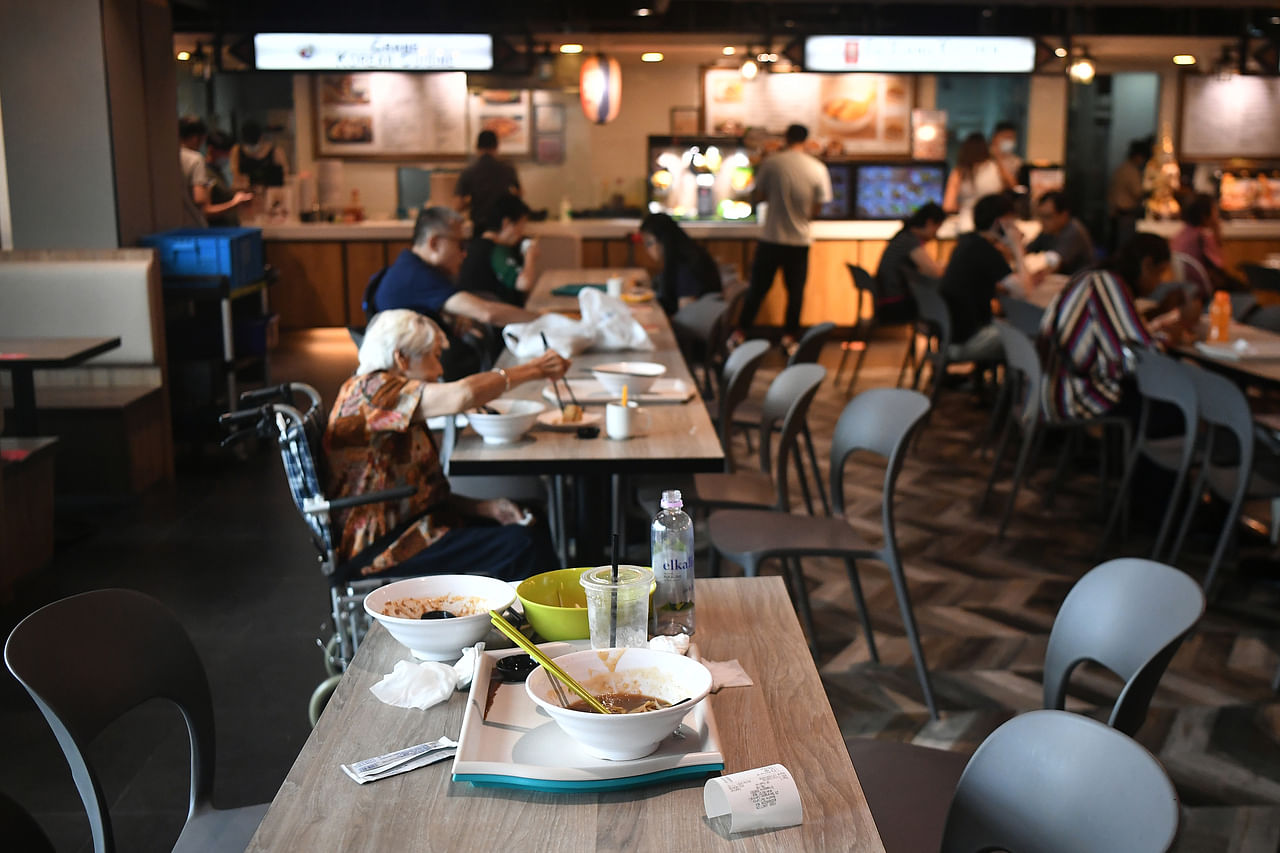Quote: Senior Minister of State for Sustainability and the Environment Amy Khor said: "There will still be cleaners needed to maintain and upkeep the general cleanliness and hygiene of the food centre... they will still have to wipe down and disinfect the tables."
Amy Khor, Chairman of the Public Hygiene Council Edward D'Silva, Dr. William Wan, general secretary of the Singapore Kindness Movement, and NEA officers have not been hanging around hawker centres long enough to observe the cleaning practice of the cleaners.
Even though the diners may have cleared the tables, it is not absolutely clean. There are condensation, spills, little food crumbs left on the tables.
When the cleaners see the tables from far, they look clean, and so the cleaners do not go over to the tables to wipe down as claimed by Amy Khor.
As for disinfecting the tables, Dot has yet to see any cleaners do that.
So the tables are left uncleaned for next diners.
It is better for the diners to leave the tables uncleared. When the cleaners clear the tables, they will have to wipe the tables which will be clean for the next diners.
Why dirty habits persist at public eating places in Singapore
Out of 20 cleaners and stall operators The Sunday Times spoke to, about 60 per cent of them said the tables are just as dirty as before.
ST PHOTO: JASON QUAH
Adeline Tan,
Jeanne Wang and
Sivakami Arunachalam
MAY 2, 2021
SINGAPORE - There are several reasons for Singaporeans to not kick their dirty habits at public dining areas.
Experts said these include not being able to see how such habits directly affect them, their heavy reliance on cleaners and the lack of a proper tray return infrastructure.
Chairman of the Public Hygiene Council Edward D'Silva said: "Diners don't see that returning their trays impacts them, because they think there are cleaners to help them clean it up."
Out of 20 cleaners and stall operators The Sunday Times spoke to, about 60 per cent of them said the tables are just as dirty as before.
One of them, a stallholder who wanted to be known only as Mr Heng, said: "In addition to cleaning the tables, we also have to sanitise the area more because of Covid-19. It would be great if more people can return their dirty crockery and trays to lessen our workload."
Polls conducted by The Straits Times in mid-April showed that people still think returning their trays will cause cleaners to lose their jobs, a misconception that was debunked by Senior Minister of State for Sustainability and the Environment Amy Khor recently.
She said: "There will still be cleaners needed to maintain and upkeep the general cleanliness and hygiene of the food centre... they will still have to wipe down and disinfect the tables."
The common reasons cited by respondents who said they did not return their trays or only returned them sometimes were inconvenience and the lack of tray return stations.
Currently, 10 per cent of coffee shops have tray return facilities, whereas 900 tray or used crockery return racks have been installed at hawker centres.
The NEA is looking to install about 75 more tray or used crockery return racks at hawker centres.
It will also provide co-funding for coffee shop and food court operators to defray costs for the installation of tray return facilities and for the purchase of trays.
ST's polls found that most diners said they return their trays after eating. About 52 per cent of the 143 respondents in the ST online poll said they returned their trays, while 41 per cent said that they return their trays sometimes. And about 65 per cent of the 133 respondents in the ST street poll said they returned their trays, or occasionally did so.
This is much higher than the average tray return rate of 35 per cent at hawker centres that NEA found in March.
ST's polls found that most diners said they return their trays after eating. ST PHOTO: LIM YAOHUI
Mr D'Silva said one reason for the discrepancy could be that people tend to be less critical of themselves. He said: "If you were to approach people in a hawker centre and ask if they return their trays, most would say yes, because they don't want to be seen as a bad guy. It's just human nature. But if you were incognito and watching from afar, it is unlikely that they would return their trays."
Dr William Wan, general secretary of the Singapore Kindness Movement, suggested stricter enforcement at public dining places to boost the tray return rate and encourage cleaner table habits.
He said: "If we can penalise people for not wearing masks or gathering in large groups, then we should also view such bad habits as a public health threat. I believe intensive enforcement is needed and people will start to abide by the guidelines."










